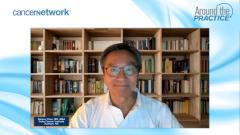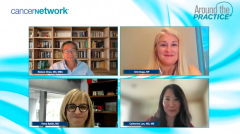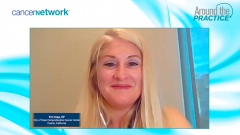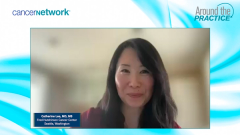
The Future of GVHD Treatment
The panel shares new therapies for the treatment of chronic graft-versus-host disease they look forward to seeing in the future.
Episodes in this series

Nelson Chao, MD, MBA: I wanted to ask: Are there any particular drugs coming down the pipe that you're particularly excited about?
Catherine Lee, MD, MS: I think the field is excited to look forward to more combination therapies, as we are seeing that maybe the combination of drugs with different mechanisms of action may help control graft-versus-host disease. Perhaps it improves it just by kind of targeting different biologic pathways in graft-versus-host disease. And so, I have personally used a combination of Ruxolitinib and Belumosudil, and I know some centers have initiated clinical trials of using these two drugs in refractory chronic graft-versus-host disease.
Hana Safah, MD: Thank you, Catherine. You're so right. I mean, in practice, many of us now have patients that we have used Ruxolitinib plus the ROK inhibitor together. Some of us have used it in patients who are refractory to one or to the other. But I've used it also in patients who have severe chronic GvHD, and I felt that they're not going to be able to be maintained on one drug only. So, I'm asking my colleagues now, and I've raised that—you know, I wouldn't say question but maybe request—that we start publishing the data. Like, maybe we can do collection on patients that have received the combination and have done well, and how did we do it so that our other colleagues can do the same? They do well. As you said, one of them has the ROK inhibitor; the safety is not bad, and the safety profile is not bad. And on the other hand, the JAK inhibitors do very well, and they have a very nice mechanism in controlling inflammation and probably fibrosis. So, adding them together can benefit patients. And probably we're doing it in refractory. Maybe we should start looking at earlier lines, and maybe we can skip steroids. Other than that, I think clinical trial will be best, but we don't have much of other options at this point.
Nelson Chao, MD, MBA: Erin?
Erin Kopp, NP: I think a lot of the excitement in the last few years that I've seen is so many steps ahead in identifying something you brought up early on: when graft-versus-host disease, the seeds are really planted, and that is early in transplant. So, post-transplant regimens that we're seeing with cytoxin, a lot of focus on that. A lot of focus on identifying if a patient has acute graft-versus-host disease or the multiple risk factors that we know about. The further work on biomarkers. There's been the foundation set. We know that there are biomarkers. What we do with them next, and I think as opposed to one specific drug, the concept of precision medicine in acute and chronic graft-versus-host disease to meet the needs of the patient systemically. And then I've also seen a growth in supportive therapy. One thing we didn't talk about a lot—because we really want to talk about stopping the disease in its tracks—is for the patient, the fact that we're able to treat these symptoms while we're treating the underlying process. I think that is probably the biggest development that patients are excited about. If I have skin that feels like it's peeling off and you have five more agents now that are going to treat them topically, that's a huge win for me as a patient. The same thing with oral sloughing. The inability to brush your teeth with toothpaste is something that patients bring to us: to not be able to not wear sunglasses outside at night because your eyes are so dry. So, the growth in the supportive therapy regimens, I think, is also something that needs more research, because it's so important to the patients concurrently with treating the underlying cause.
Nelson Chao, MD, MBA: Absolutely. And the one thing we shouldn't forget, though, is that there are lower relapse rates of people with chronic GvHD.
Erin Kopp, NP: True.
Nelson Chao, MD, MBA: Sometimes we have to learn how to balance the Yin and Yang of chronic GvHD. I wanted to thank you all. This has been a fantastic and lively discussion, brought to you by the Cancer Network. Thank you to our viewing audience. We hope you found this interactive discussion to be informative and beneficial to your clinical practice.
Newsletter
Stay up to date on recent advances in the multidisciplinary approach to cancer.







































